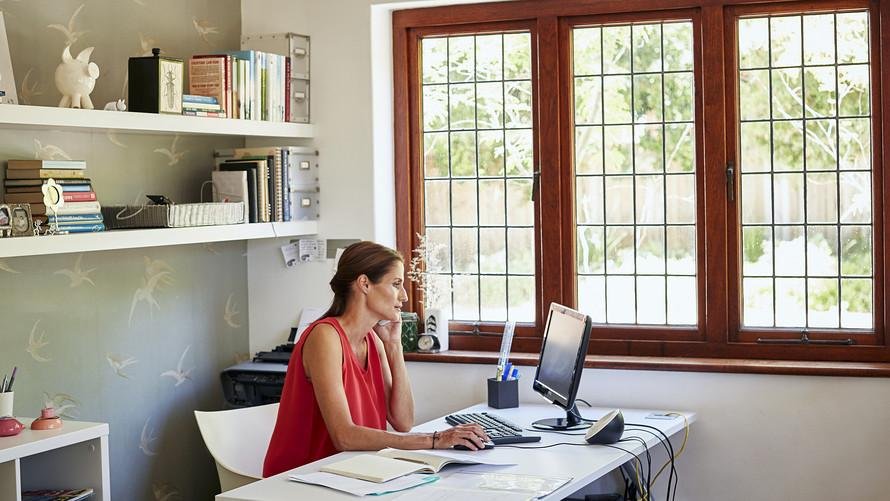Working from home as an Independent Contractor has many perks! I don’t have to tell you- you know exactly why you want to work from home! However, something very important has come up several time during my years as an independent contractor- The dangers of being sued!
While it may sound like I am being slightly paranoid, it is a genuine concern many people have.
As an Independent Contractor you work for yourself. You represent yourself and most likely you signed a nice long contract before beginning work with your company of choice.
Recently this concern was mentioned in a forum in regards to working as a collector for a collection agency. There are many laws involved with being a debt collector and if you are not aware of those laws and violate them…you could possibly be held liable! What about those Direct Response lines where you must get the exact response after reading a script word for word? What if you make a mistake and sign someone up for something they didn’t actually agree to? As an independent contractor, you could be held liable if your lengthy contract does not say otherwise!
Yeah, I know that most likely the company you are contracted to work for would be held responsible. But it may not be worth the risk. If you are concerned about the dangers of working as an Independent Contractor, there are a few things you can do to secure your property from any lawsuits.
Be choosy about the company you work for.
Collection Agencies will probably run a higher risk of lawsuit than say an appointment setter.
Play it by the books!
Follow your scripts word for word and listen to your callers closely. The less mistakes you make, the less likely you will be faced with a lawsuit.
Incorporate yourself.
Although many of these home based call centers don’t exactly treat you like a business entity, you are. Incorporating your business can take time and money but it will separate your personal property and money from your business. Meaning if you do ever face a lawsuit, your children and cats wont have to suffer over it.
Incorporating your IC business is the most ideal solution to the risk of being sued. There are several ways to go about the process and it can seem very intimidating! I would suggest beginning by learning more about what it means to incorporate. Then you can check out websites like the Small Business Association to learn more about how to go about the processes of incorporating. There are many companies online, such as MyCorporation and American Incorporators that will handle the headache of paperwork and will file all of it for you for a fee. Learn your options and make an informed decision.
1. Is it dangerous to work from home as an independent contractor?
Working from home as an independent contractor can present specific challenges, but it isn’t inherently dangerous. Risks often stem from a lack of structure, boundaries, and potential isolation. However, many people successfully thrive in remote environments by establishing routines, setting boundaries, and maintaining social connections. It’s important to recognize and mitigate any risks to create a productive and safe work environment.
2. What are the common risks associated with remote work for independent contractors?
Common risks include:
- Isolation: Lack of social interaction can lead to feelings of loneliness and mental health issues.
- Work-Life Balance: Difficulty in separating work from personal life can lead to burnout.
- Distractions: Household responsibilities or family members can interrupt focus and productivity.
- Inconsistent Income: Independent contractors often face fluctuations in income, leading to financial stress. Understanding these risks is crucial to developing strategies to mitigate them.
3. How can I create a productive workspace at home?
To create a productive workspace:
- Designate a Specific Area: Choose a quiet, dedicated space that is free from distractions.
- Ergonomics Matter: Invest in a comfortable chair and desk setup to promote good posture.
- Minimize Distractions: Limit noise and interruptions by setting boundaries with family or roommates.
- Personalize Your Space: Add elements that inspire you, such as plants or artwork, to make it more inviting. Having a well-organized and inspiring workspace can significantly boost productivity and focus.
4. What strategies can I use to maintain work-life balance?
To maintain work-life balance:
- Set Clear Boundaries: Define your work hours and stick to them. Communicate these hours to others in your household.
- Schedule Breaks: Incorporate regular breaks to recharge and step away from your workspace.
- Use Tools and Apps: Consider productivity tools to help manage your time and tasks effectively.
- Engage in Activities: Make time for hobbies, exercise, and social activities to create a fulfilling life outside of work. Balancing work and personal life is essential for long-term success and well-being.
5. How can I stay socially connected while working from home?
To stay socially connected:
- Regular Check-ins: Schedule virtual coffee breaks or meetings with colleagues and peers.
- Join Online Communities: Engage with industry-specific forums, social media groups, or professional networks.
- Attend Webinars and Workshops: Participate in events to connect with others and continue learning.
- Collaborate on Projects: Look for opportunities to work with others on joint projects or initiatives. Maintaining connections can help combat isolation and foster a sense of community.
6. What financial risks should I consider as an independent contractor?
Independent contractors often face financial risks such as:
- Inconsistent Income: Irregular work may lead to fluctuations in cash flow.
- Lack of Benefits: Unlike traditional employees, contractors typically don’t receive health insurance, retirement benefits, or paid time off.
- Self-Employment Taxes: Contractors must manage their taxes, including self-employment tax, which can be higher than traditional employment. To mitigate these risks, it’s important to budget wisely, build an emergency fund, and consider investing in your own benefits.
7. What tools can I use to enhance my productivity while working from home?
Consider using tools such as:
- Task Management Apps: Tools like Trello, Asana, or Todoist help you organize tasks and projects.
- Time Tracking Software: Tools like Toggl or Clockify can help you monitor how you spend your time.
- Communication Platforms: Utilize Slack, Zoom, or Microsoft Teams to stay connected with clients and colleagues.
- File Sharing Services: Google Drive or Dropbox facilitate easy access to documents and collaboration. Leveraging these tools can enhance your efficiency and streamline your workflow.
8. How can I maintain a professional image while working from home?
To maintain a professional image:
- Dress Appropriately: Even if you’re at home, dressing professionally can enhance your mindset and focus.
- Create a Professional Environment: Ensure your workspace is tidy and free of clutter, especially during video calls.
- Communicate Effectively: Use clear and professional language in all correspondence, and be responsive to emails and messages.
- Showcase Your Work: Maintain an updated portfolio or website that highlights your skills and projects. By prioritizing professionalism, you can positively influence how clients perceive you.
9. What should I do if I feel isolated or lonely while working from home?
If you feel isolated:
- Reach Out: Talk to friends, family, or colleagues regularly to share your experiences and feelings.
- Participate in Online Events: Engage in virtual meetups, webinars, or industry events to connect with others.
- Seek Support: If loneliness persists, consider speaking with a mental health professional or joining support groups.
- Practice Self-Care: Prioritize activities that bring you joy and relaxation, whether through exercise, hobbies, or meditation. Taking proactive steps to connect with others and care for your mental health is crucial for overcoming feelings of isolation.
10. How can I protect my mental health while working from home?
To protect your mental health:
- Establish a Routine: Create a daily schedule that includes work hours, breaks, and personal time.
- Practice Mindfulness: Incorporate mindfulness practices, such as meditation or deep-breathing exercises, to reduce stress.
- Stay Active: Engage in regular physical activity to boost your mood and energy levels.
- Set Realistic Goals: Break tasks into manageable steps to avoid feeling overwhelmed and celebrate your achievements.
- Seek Balance: Make time for social interactions, hobbies, and self-care to maintain overall well-being. By prioritizing mental health, you can foster a more enjoyable and sustainable work-from-home experience.



